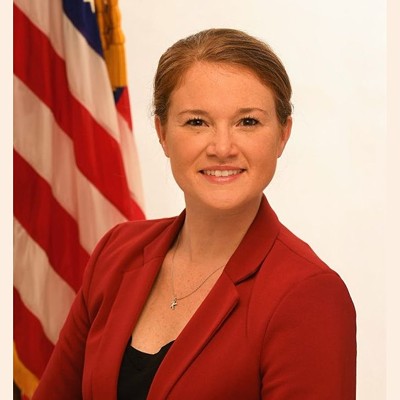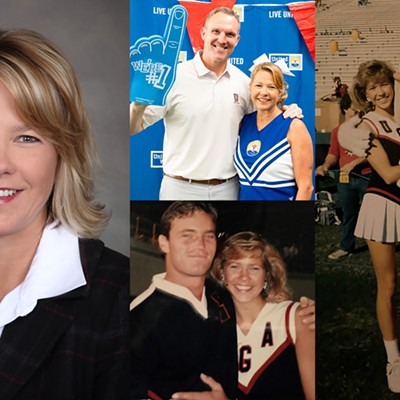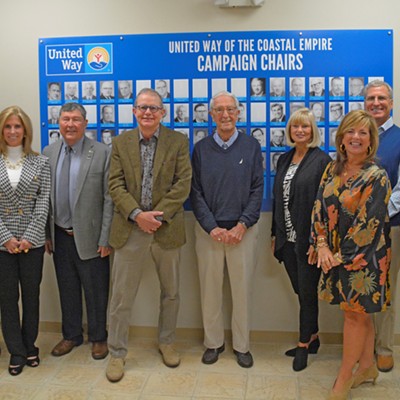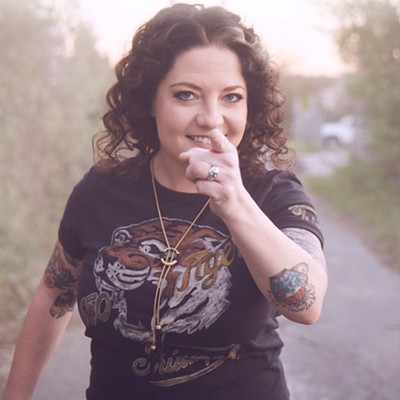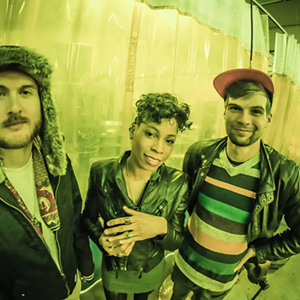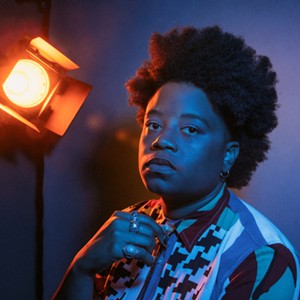The following is the full transcript of Connect’s recent interview (conducted by Music Editor Jim Reed) with AWOL’s Executive Director DaVena Jordan concerning her non-profit youth organization’s upcoming Hip-Hop History Play at the Lucas Theatre.
For more information on the 3rd Annual installment of this inspiring program, click here.
This will be the third year in a row that your organization has mounted this play. I understand there is a different theme or angle to this production, but how much of the actual play itself changes from year to year and how much will be familiar to those who have attended in years past?
DaVena Jordan: The Hip-Hop History Play has somewhat evolved, so to speak. The first year we only set out to tell the actual history of hip-hop culture and music itself, but since then the production has evolved into teaching history through hip-hop. For example, last year we taught audience members the importance of the African Griots. This year will focus on bridging the gap between the Civil Rights Generation and the Hip-Hop Generation, a gap that has grown wider and wider over time.
As for the actual style of the play, we did in fact do something a little bit different by giving the production a story line with a few main characters instead of only using narrators to drive the plays many topics. What will no doubt be familiar to audience members who have attended past shows, is the wealth of performances depicting artists like Kanye West. We even have a little James Brown this year, as well.
There are over 50 cast members this year. Give me the age range of the performers and tell me how many of them are alumni from previous years’ productions.
DaVena Jordan: The age range of the performers is anywhere from five to 50. We always have great adult performers who want to participate. As for alumni, we have a total of ten old cast members who are still with us, and even a few that have been in all three shows now.
Each year, members of the cast portray real-life historical figures, such as rappers, poets, DJs, dancers, etc... How do these kids go about crafting their characterizations of these figures? Do you help them to find archival footage of the real people to study?
DaVena Jordan: The kids are so great at finding their little niche as they attempt to perform the characters. We actually don’t give them much direction other than sending them off to search YouTube for old footage of the person’s performance. In a nutshell, each year the kids tend to own their charactesr and once that happens, they work really hard to make it look like the real thing.
Who are some of the famous figures that will be portrayed this year by the actors and actresses in the play?
DaVena Jordan: Malcolm X, Talib Kweli, the Bob Marley. Inside this year’s program book, folks will get to see historical data on the Civil Rights Movement, but they’ll also get a chance to read up on Bob’s contribution to not only music but his role as an activist for the people of Jamaica. We think it’s really important to not only look at an artist’s music, but to also look at what contributions they have strived to make to society through their music.
Have any of the kids ever tried to directly contact any of the living icons to see if those legends wanted to offer specific advice or encouragement to the young person playing them?
DaVena Jordan: No, but now that you mention it, it might not be a bad idea for us to include that as a task for them in next year’s play!
How much actual rehearsal time has gone into this production?
DaVena Jordan: Tons, and I mean tons. We start getting ready for this event in October of 2007. In all fairness, it does not take that long to put on the actual show, but as you know, A.W.O.L. does much more than just present the arts. We are a youth development program supported by the City of Savannah, the United Way and the Children and Youth Coordinating Council. The actually play is supported in part by a grant from the Georgia Council for the Arts through their Grassroots Arts Project. These kids start from ground zero, with many of them having no theater experience at all. So, they are taught the basics first, then a little conflict resolution and anger management, and when all that’s done, we actually starting practicing for the show. Our theater program is a starting point for many urban youth looking to showcase their many talents.
Who is responsible for actually writing the play?
DaVena Jordan: The play is written collectively by staff members and past participants. Basically we all get together a few months prior to the big event and come up with a theme, and then we talk about what characters might jive well within that theme. People talk about artists they would like to see the kids portray and how might be a good way to portray that artist.Once that’s all done, we are sent off to began writing our scenes. A few months later, you have all the pieces and mesh them together as one big performance. A large majority of the dialogue driving the story line concept this year was actually written by Mr. Clinton D. Powell of the Spitfire Poetry Group. Mr. Powell is also directing again this year.
How long does the show run?
DaVena Jordan: This is something that we are looking at changing. The kids work so hard and we actually only run it for one big day, with a morning school show and an evening performance that is open to the public. Because of the limited number and types of venues in Savannah we are pushed to try and fill 1,200 seats at the Lucas. Ideally, the new 500-seat cultural arts center being built by the City would be a better fit. This would allow us to run more shows next year.
I know in years past you have enjoyed great attendance. Do you feel the Hip-Hop History Play is becoming a tradition in Savannah that folks look forward to?
DaVena Jordan: In the past, we have always neared capacity, and even sold out some years. We have all intentions to keep on doing this play every year. Not only do the kids look forward to it, but so do community members. We are really happy about its success and hopeful for future success. The play really gives Savannah’s kids a time to shine. In my opinion, we are always too busy bringing or trying to bring in acts to Savannah for entertainment when we have a wealth of talent right here in the community. Many of them simply lack the means to participate, or no one has given them a chance.
I assume that most of the folks who attend have some direct or indirect relationship to one or more of the kids on stage. Have you been surprised at all to see people come out who have no prior knowledge of —or experience with— A.W.O.L. or hip-hop in general - or is that a development that has yet to occur on a large scale?
DaVena Jordan: Its funny that you should mention that, because Tony (Jordan, A.W.O.L. founder and CEO) and I just talked about this last week! We were looking back at some video footage taken by our film crew kids from last year’s event where they actually interviewed audience members during intermission. We where so surprised at the number of people who simply came out based on curiosity! Many of them we had never seen or met, and they knew no one in the play. Of course, the cast brings their own fan club so to speak, but we are definitely tapping into other audiences as well.
I understand that this year’s theme of “The Civil Rights Generation Meets The Hip-Hop Generation” is meant to serve as a bridge of sorts to an older crowd who may view the hip-hop and rap lifestyle as a negative, antagonistic and misogynistic force in today’s popular culture. In fact, in a recent magazine article, Tony was quoted as saying that with regard to the two different generations, “The fight is the same and the goal is the same.” Yet, even though there are strong positive roots in the hip-hop community (which are still on display today) there is no denying that in many respects, thuggish posturing —that glorifies drug abuse, crime, objectification of women and violent behavior in general— is rampant in today’s hip-hop scene. How does A.W.O.L. deal with this unfortunate reality and square that with the idea that this generation truly has the same goals in mind?
DaVena Jordan: We don’t “preach” to our kids about what they should or should not listen to as it far as hip-hop goes. Being in A.W.O.L. is about being introduced to a whole new culture that is enveloped and driven by all things positive concerning hip-hop. Sure, we know about all the negatives concerning hip-hop, but what we challenge kids to do is to really listen to the words, analyze them, figure out if what or who they are talking about really represents you, and then make their own choice. In many of our programs, we teach kids to become media literate. Meaning they must learn how to decipher the many mixed messages given to them by the media in general, not just by rap music. Even the local news has media messages, some good and some bad. So for A.W.O.L., the reality is that all things have both good and bad sides, but what really matters is to make a choice about what side you want to be on.
As for the hip-hop and civil rights generations, there is no doubt the similarities are there. This hip-hop generation is still striving for equality in a world that seems to not understand its true meaning. Record companies and radio conglomerates have taken the medium and used it to drive incomes instead of allowing the music and the artists to stand on their own merit. What bothers us the most, is that, although the actual hip-hop artist has no control over whether or not they get a deal, or get airtime on the radio, hip-hop gets blamed for so many of society’s ills. Just as the civil rights generation fought for equality, hip-hop is doing the same thing, but in a much more complex environment.
Tell me a bit about A.W.O.L.’s efforts in exposing school-kids from local and regional cities to this show.
DaVena Jordan: This year we sent out Press Kits to schools clean across the water in Jasper County. Last year some 200 kids came to the show from Hinesville alone, so we are really attempting to make this not only a local event but a regional one as well.
A.W.O.L. stands for All Walks of Life, and yet it would appear that the organization’s makeup is overwhelmingly black. I imagine that this is due in large part to the organization’s focus on hip-hop culture (which seems often to be viewed as inseparable from the modern spoken word movement). Roughly what percentage of those who participate in your programs come from other demographic groups?
DaVena Jordan: Roughly about five percent of our participants are made up by other demographic groups. While our marriage to hip-hop does play a role, what really plays a greater role is our commitment to young people growing up in difficult situations, mainly poverty. This City of Savannah has a real problem with poverty that has been entrenched in (certain) areas of this community for years. A.W.O.L. strives to meet this population first and foremost — which unfortunately is made up largely of minorities populations.
Are you at all concerned that the organization’s membership is not more diverse?
DaVena Jordan: No, I would not say we are concerned about it, only that we are continuing to offer the program to anyone who wants to participate.
Are there any specific sections of this year’s play that either you or Tony are especially excited about?
DaVena Jordan: I am excited about the Bob Marley scene, as he is truly one of my favorite artists. Bob is actually being portrayed by one of our adult performers that is always willing and ready to help out with the play — Steve Baumgardner, better known as “Basik Lee” of the local hip-hop group, Dope Sandwich.
What would you say to try and convince someone who may know nothing of —or care little for— hip-hop culture to come out and support this endeavor?
DaVena Jordan: If you know nothing at all about hip-hop or care little for the hip-hop culture should not matter one bit. What really matters is getting to see Savannah’s young people having fun and doing something positive. An investment in our young people is an investment in our future as a community.

